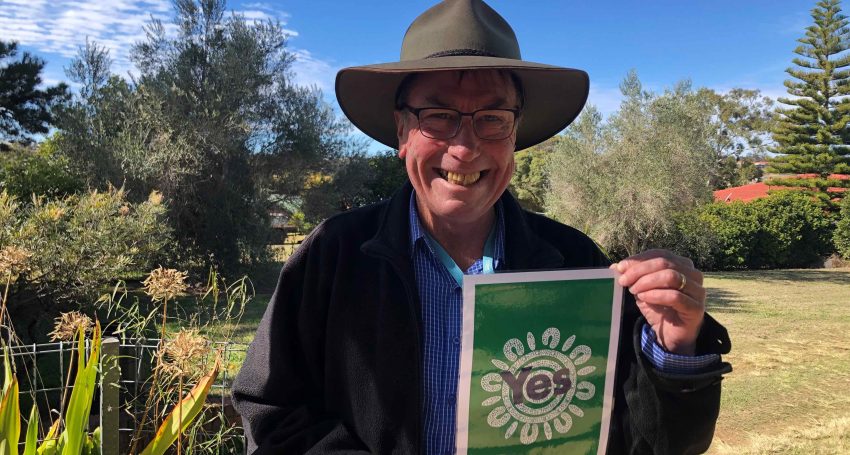Why I am voting "yes" in the referendum: The Rev’d Rick Gummow
Features
“Like all regional Queenslanders, I value pragmatic solutions, including for systemic issues, and I value listening to people on the ground about the things that directly impact them. Closing the health and life expectancy gap between non-Indigenous and Indigenous Australians is a systemic issue that can be resolved if we support constitutional recognition of Indigenous Australians through a Voice to Parliament,” says The Rev’d Rick Gummow

Story Timeline
- Why I support constitutional recognition through an Aboriginal and Torres Strait Islander Voice to Parliament: Aunty Dr Rose Elu
- Why I am voting “yes” in the referendum: Sue Cooke
- Why I am voting “yes” in the referendum: The Ven. Geoff Hoyte
- Why I am voting “yes” in the referendum: Phyllis Marsh
- Why I am voting “yes” in the referendum: Bishop Daniel Abot
- Why I am voting “yes” in the referendum: Adrian Malone
- Why I am voting “yes” in the referendum: The Rev’d Cameron Freese
- Why I am voting “yes” in the referendum: Uncle Milton Walit
- Why I am voting “yes” in the referendum: Marilyn Wright
- Why I am voting “yes” in the referendum: Barry Kuskopf
- Why I am voting “yes” in the referendum: Aiden Wu
- Why I am voting “yes” in the referendum: Reg Dean
- Why I am voting “yes” in the referendum: Jill Rylatt
I grew up in Cairns at a time when Cairns really was a country town. I went to a local state school where I had many Aboriginal classmates. We all played together — hung around in the same friendship groups, shared tuck-shop lunches, collected tadpoles after school and played cricket and footy together. As mates, we cared about and wanted the best for each other. This is what unity is about.
Advertisement
Despite this, I grew up around a lot of racism towards Aboriginal and Torres Strait Islander peoples in Cairns. This was commonly expressed by adults in “respectable” conversation, especially through highly offensive slang names. When I look back, I see that this was truly horrible.
Conversations are different these days among adults, which is welcoming. I very rarely hear such offensive commentary. However, while the language has changed, I wonder if behaviours and a willingness to listen have.
Like all regional Queenslanders, I value pragmatic solutions, including for systemic issues, and I value listening to people on the ground about the things that directly impact them. Closing the health and life expectancy gap between non-Indigenous and Indigenous Australians is a systemic issue that can be resolved if we support constitutional recognition of Indigenous Australians through a Voice to Parliament. The Voice is a pathway for Aboriginal and Torres Strait Islander peoples at the grassroots to communicate the facts and their concerns in real time and suggested solutions in a clear and focused way. The Voice’s design principles show that members of the Voice will be selected by Aboriginal and Torres Strait Islander communities and that they will serve for fixed terms to help ensure accountability to their communities.
So I am voting “yes” on referendum day because I want to help bring about real measurable and practical change for my Aboriginal and Torres Strait Islander brothers and sisters. It would be wonderful to see the health and life expectancy gap between non-Indigenous and Indigenous Australians closed. The best way for this to happen is if they can have a real and direct say from the ground up.
Editor’s note: The Anglican Church Southern Queensland supports the Anglican Board of Mission’s 2017 call for “a Constitutionally Entrenched First Nations Voice”. The ACSQ also supports the Anglican Church of Australia’s Joint Affirmation of Faith and Justice with First Nations Peoples (carried by affirmation at General Synod, Oct 2007), and seeks practical ways to do so, including our association with Reconciliation Australia and the prescribed process of Reconciliation Action Plans.
Editor’s note: 21/07/2023: This anglican focus feature, written by The Ven. Geoff Hoyte, The Rev’d Michael Stalley and The Rev’d Rick Gummow, provides a timeline showing how the ACSQ came to its position on recognising Aboriginal and Torres Strait Islander peoples in the Constitution through a Voice to Parliament.





